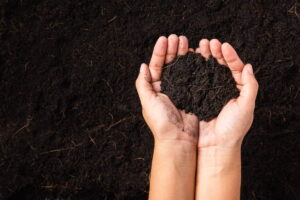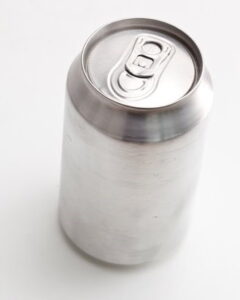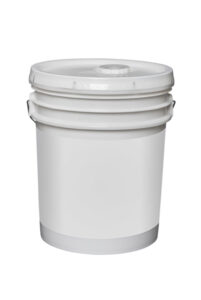Composting occurs when natural material decomposes with the help of heat, microorganisms, and chemistry. It helps to keep material out of landfills, saves on fertilizer, and has numerous other benefits. It’s not a quick process, though. This article will cover what you can use or do as a compost accelerator to speed up your compost. These include things you can purchase, procedures that you can do, or things you can make yourself.
There is no magic pill, this is a natural process, but there are things you can do or use to help speed up composting in a compost pile.
What is a Compost Accelerator?
A compost accelerator, also called a compost starter, is a product that is marketed to speed up the composting process. Some are frustrated by
a how long composting takes, or they feel like their composting efforts aren’t paying off.
Therefore, manufacturers sell products designed and marketed to speed up that composting process by supporting the growth of the composting microorganisms, maintaining the right pH balance, and more.
Some of these may work, but many don’t tell you what’s in them, how they work, or how you can know if they work. They simply expect you to trust them and to buy them.
Some have chemicals or fertilizers in them. This means that your efforts to support a natural process, reduce fertilizer and reduce chemicals are being undone by adding some of the compost accelerators.
How Does a Compost Accelerator Work?
The concept is that the compost accelerator is supposed to do one or more of
- Creating a better environment for the growth of the microorganisms that you need for composting. Composting occurs largely because bacteria help your compost decompose into its core components that you can add to the soil. This is a natural process that we are looking to support. Compost accelerators often claim to work by adding chemicals or nutrients to help with this.
- Adding More Microorganisms – Some compost accelerators claim to add more microorganisms you want for composting. They claim this will help your compost process happen faster.
- Adding More Healthy Nutrients to Your Compost is similar to the first point. They often add fertilizers, nitrogen and other components to your compost to help it along. The problem is that this is often done through chemical processes that aren’t environmentally friendly, so we are undoing some of the good we are trying to do through composting.
Overall, compost accelerators are substances that claim to help your composting process along by supporting the natural process, adding nutrients and even adding more microorganisms to your compost.
Is a Compost Accelerator Worth It?
It’s difficult to answer if a compost accelerator is worth it. If you want to be environmentally friendly, reduce landfill waste and reduce the use of chemicals and other fertilizers, then compost accelerators may be doing more harm than good.
Also, if your compost pile isn’t composting like you think it should, you may want to explore why. This process takes time, but you should see results within a few weeks. The material should be noticeably decomposing, and it shouldn’t stink. If something else is wrong, you may want to explore why.
A compost accelerator may kickstart things, but if you don’t have the right environment, your compost pile will likely have problems again anyway. So, a compost accelerator is just covering up other issues there.
Shopping For A Compost Accelerator
If you decide you want to try a compost accelerator/compost starter, then here are a few things that you may want to consider.
- Read the ingredients – Avoid a compost starter that doesn’t list ingredients. If it lists them, then do some research on the components. Here are a few things to look for
- Are they organic? Composting should be an organic process. We don’t want to be adding a bunch of odd chemicals to our compost (and then our garden)
- Are They Helpful? – Do a quick Google search, and see if that’s actually something that helps.
- Are They a Chemical Fertilizer? – Avoid chemical fertilizers. They have several problems that we want to avoid. That’s part of the point of composting.
- Research Microorganisms – If they introduce bacteria or other microorganisms to your compost, what are they? Do some research to ensure that they are actually something you want in your compost and soil.
- Read The Reviews – First, are there any reviews? Have others used it? Did it help? Read the reviews critically. Unfortunately, it’s easy to get or write fake reviews, so read through them and make sure they aren’t too effusive with praise and that they sound like they are written by a real person.
- Get References – Do you know anyone else in your community who composts? Have they used a compost accelerator? Did it work for them? What did they like (or not like)? Was it worth it?
Unfortunately, it’s all too easy for someone to sell you snake oil that doesn’t actually do anything. They might even sell you something that could worsen things or be environmentally harmful.
Organic Ways to Accelerate Your Composting
Before you try a chemical compost starter, we have a few simple techniques for you to try. We even have a “home remedy” that you can use to make your own compost starter that’s all-natural, it works, and can be fun to make. If you have kids, this might be a good chance to get them interested in biology and chemistry!
Compost needs a few things going on to work correctly. The truth is that you can bury a bunch of scraps into a pile (often called trench composting, or cold composting), and it will eventually break down into compost. It takes a while. So we need to do a few things to help that along.
We could cover a lot of biology and chemistry here, but we won’t. We’ll give you a list and then a few things you can do to help your compost meet that list. For a good, productive compost pile, you need:
- Oxygen – You want oxygen to help the decomposition process and support the microorganisms we want for our compost. This is called aerobic composting. If you don’t have oxygen, then you end up with anaerobic decomposition, which is basically rotting and it’s stinky and not as effective.
- Heat – For correct decomposition, your compost pile needs to heat up to support the microorganisms and the decomposition that we want.
- Brown to Green Ratio – This is a complicated way of saying that you want a good mix of green material (like fruits, vegetables and such) and brown material (like paper, wood, leaves, and such).
- Moisture – You need to have the right amount of moisture. This is a bit of a Goldilocks zone. Not too wet and not too dry. Your compost should be about the consistency of a damp sponge.
With these things, you should have an efficient compost pile going. Let’s talk about some ways to get them.
1. Turn Your Compost
You want to periodically turn your compost. That means, basically, stirring it up. Turning your compost ensures that material is mixed. It also allows oxygen/air and moisture to be mixed into the compost.
The right mixture of these components keeps your pile composting and the ratio of browns to greens right. This keeps the compost pile at the right temperature and ensures that the composting process continues most efficiently.
By turning your compost, you ensure that the right components are in place for composting to occur.
More: How Often to Turn Compost
2. Maintain the Right Ratio
There’s all sorts of information out there about what this ratio should be, but it’s not very practical because you need to know how much nitrogen and how much carbon there is in the material in your compost pile. We recommend something much simpler – use you senses. They will tell you what you need to do.
Compost shouldn’t stink. If it does, something is off. If it doesn’t look right, then something is off. By using your senses you can get a pretty good idea of whether your mix is off and what you need to do.
More: The Perfect Compost Ratio Brown to Green in 1 Easy Step
3. Keep the Right Moisture
Like many things in nature, water is key to making compost work. Good compost should be about 40-60% water. This may seem like a lot, but considering that humans are about 60% water, that tells you that compost has a lot of room for a lot of water.
Ideally, your compost should be moist but not wet. If it’s dry and clumpy, the microorganisms that we need can’t survive, and it will be hard to get the right temperature.
Too wet, and we are drowning in our compost. That also keeps it from decomposing correctly.
Your compost should be moist, something like a moist sponge. It shouldn’t be dripping wet, and it shouldn’t be falling apart. The moisture should be helping it stay together, and it should feel moist.
Just like with the brown to green ratio – we aren’t chemists, and you don’t need to be either. Pick up a handful of your compost. If it falls through your fingers or has a sandy texture, then it’s too dry.
If water is dripping out of it, then it’s too wet.
| What’s It Feel Like | What’s Wrong | How to Deal With It |
| A sandy texture, feels dry or falls through your fingers when you pick it up. | Too Dry | Add water, turn your compost to mix the water into your compost |
| Water is dripping out of the compost or pooling below the compost | Too Wet | Add more brown material (e.g. leaves, cardboard, wood) and turn your compost |
That’s about as complicated as it gets.
If you use municipal water, cities often add chlorine and other disinfectants to kill off any bacteria or viruses that might get you sick. Of course, we want that, but those same disinfectants aren’t great for the ones we’re trying to breed in our compost.
Therefore, if you use municipal water, you might want to consider using rainwater, stream water, or other natural sources. It’s usually not critical; you can compost using municipal water (I have) but if you’re having trouble getting your compost to start, why not try changing some things?
4. Cut Up Your Compost Material
If you look at any of our recommendations for composting things, there are a few common recommendations for almost everything. One of those is that we almost always recommend ripping, cutting, chopping or otherwise making your compost material smaller.
When you want something to decompose, the more surface area (i.e., outside parts) that are exposed, the faster that can happen. When you cut it up, you expose more of the item. An easy example is a piece of fruit. If you toss a whole piece of fruit in your compost, only the outside skin areas is exposed. As that decomposes, a layer of the inside portion is exposed, but there is always a large portion of the fruit that isn’t exposed, and so the decomposition isn’t happening as fast with those parts.
When you cut it up, you expose the outside and part of the inside of the fruit. The smaller you cut it up, the more area that’s exposed to the bacteria, insects, worms, and air that are all working together to compost your fruit. This means that they can make it faster.
Often, if you threw the whole thing it, it would eventually compost, but maybe not for months or years. By cutting it up, we’re cutting down on that time considerably. So, you don’t need to make cutting up your compost a new part-time job, but spending a few minutes cutting it up some, smashing it, pureeing it, or whatever, will go a long way to speeding up the composting process.
5. Add Finished Compost
As one compost pile is ready, you can save some on the side and add it to the next pile. This will help to move the microorganisms and nutrients to help the next pile get started. This is probably the easiest and cheapest compost starter around.
Do It Yourself Compost Accelerator
As you can see, there are a lot of things that we can speed things up that don’t require any chemicals or paying for anything extra. You’ll see that we’re doing a lot of the same things here by adding water, turning, and helping our microbes.
If these things aren’t enough for you, or you just want to see if you can get your compost pile working faster, you can actually make your own compost at home. This can be kind of fun.
Home Compost Accelerator Recipe

Here is how you can make your own compost accelerator at home. This DIY solution can give you the raw ingredients that you need before you try a commercial compost accelerator:
How Long It Takes: 1 hour
Prepare the Yeast

Open the can of beer and let it sit out for at least 24 hours. That will help it to come to room temperature and lose its carbonation.
Add Water

Pour one gallon of warm water into a five-gallon bucket. Water is a key component and often compost heaps are too dry. This will help to get things started.
Mix in the Yeast (Beer)
Add the beer to the water. The yeast that’s in the beer helps the growth of bacteria and fungi
Add Some Cola

Pour the cola into the bucket. The sugar is a good source of carbon for our microbes.
Add Ammonia
Add the ammonia to the solution. This adds nitrogen into our compost starter and helps balance the ph (the acidity).
Stir Everything Together
Stir well. Make sure that everything is blended together.
Pour on Your Compost
Pour the mixture over your compost heap.
Add In the Soil
Add the garden soil, which helps to add even more microbes.
Turn Your Compost
Turn your compost to mix everything together.
Estimated Cost: 5 USD
Supply:
- One gallon of water (rain water or water from a stream is preferred)
- One can of flat, warm beer (not light beer)
- One can of non sugar-free cola (any brand will do)
- ½ cup of household ammonia
- 2-3 shovels full of high-quality garden soil
Tools:
- Five-gallon bucket
- Shovel
Adding Commercial Compost Accelerators
Before you try a commercial compost accelerator, consider these steps first. They are often enough to get you started. Some compost accelerators can help, but others don’t tell you much about what they are or how they do it. Before adding chemicals to your compost, better to do things that you know work to get your compost started.
